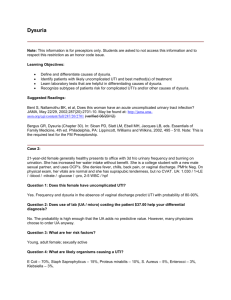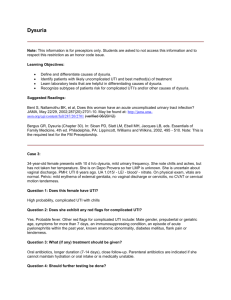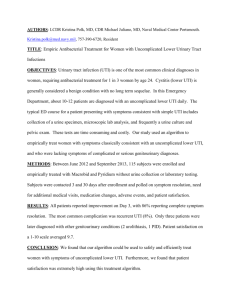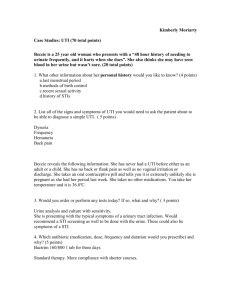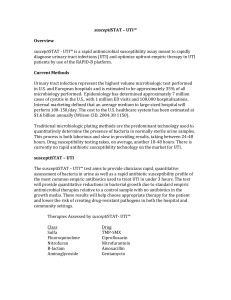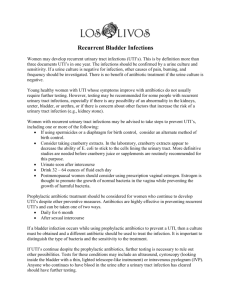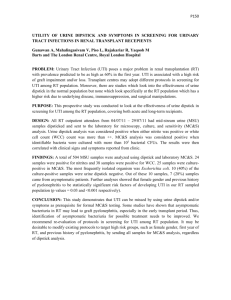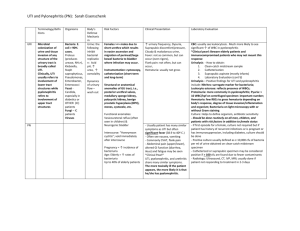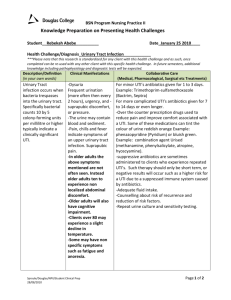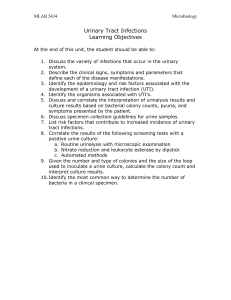Study - BioMed Central
advertisement
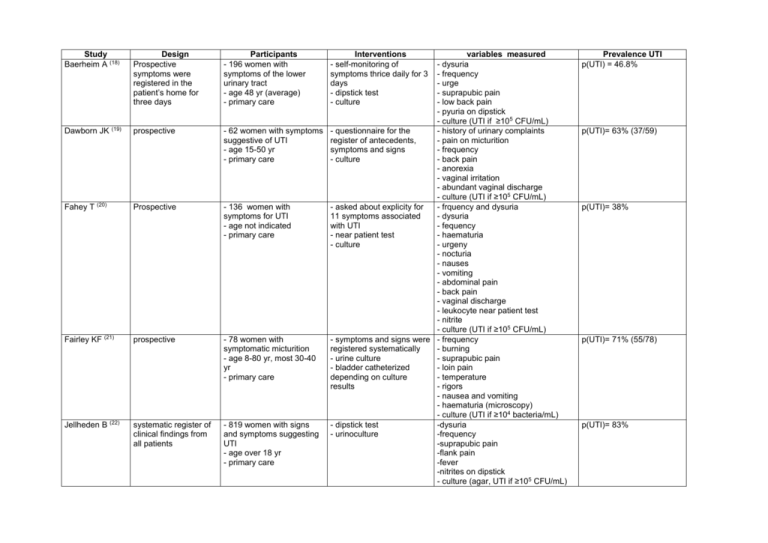
Study Baerheim A (18) Design Prospective symptoms were registered in the patient’s home for three days Dawborn JK (19) prospective Fahey T (20) Prospective Fairley KF (21) prospective Jellheden B (22) systematic register of clinical findings from all patients Participants - 196 women with symptoms of the lower urinary tract - age 48 yr (average) - primary care Interventions - self-monitoring of symptoms thrice daily for 3 days - dipstick test - culture variables measured - dysuria - frequency - urge - suprapubic pain - low back pain - pyuria on dipstick - culture (UTI if ≥105 CFU/mL) - 62 women with symptoms - questionnaire for the - history of urinary complaints suggestive of UTI register of antecedents, - pain on micturition - age 15-50 yr symptoms and signs - frequency - primary care - culture - back pain - anorexia - vaginal irritation - abundant vaginal discharge - culture (UTI if ≥105 CFU/mL) - 136 women with - asked about explicity for - frquency and dysuria symptoms for UTI 11 symptoms associated - dysuria - age not indicated with UTI - fequency - primary care - near patient test - haematuria - culture - urgeny - nocturia - nauses - vomiting - abdominal pain - back pain - vaginal discharge - leukocyte near patient test - nitrite - culture (UTI if ≥105 CFU/mL) - 78 women with - symptoms and signs were - frequency symptomatic micturition registered systematically - burning - age 8-80 yr, most 30-40 - urine culture - suprapubic pain yr - bladder catheterized - loin pain - primary care depending on culture - temperature results - rigors - nausea and vomiting - haematuria (microscopy) - culture (UTI if ≥104 bacteria/mL) - 819 women with signs - dipstick test -dysuria and symptoms suggesting - urinoculture -frequency UTI -suprapubic pain - age over 18 yr -flank pain - primary care -fever -nitrites on dipstick - culture (agar, UTI if ≥105 CFU/mL) Prevalence UTI p(UTI) = 46.8% p(UTI)= 63% (37/59) p(UTI)= 38% p(UTI)= 71% (55/78) p(UTI)= 83% Study Lawson DH (23) Design prospective Participants -343 women with symptomatic micturition - age 15-55 yr Interventions - use of a questionnaire to register data - urine sample - urinoculture - control of evolution after 14 days Leibovici L (24) prospective - 266 women with dysuria - 17 to 25 years old - primary care - clinical interview and examination followed a check-list - urine sample taken for dipstick and culture MedinaBombardó D (25) prospective - 343 women with incident urinary symptoms - Median age 44 years old, (range 15-90) - Primary care - clinical systematically interview and clinical exam by check-list - urine reactive strip test - urinoculture Nazareth I (26) prospective - 61 women presenting with symptoms on urination (frequency or dysuria) - 16-45 years old - primary care - no antibiotic treatment - data on symptoms, signs and clinical exam were collected by the physician using a questionnaire with open questions - urine sample for culture variables measured - pyrexia - loin pain - frequency - dysuria - nocturia - stress incontinence - previous symptoms - culture (UTI if ≥105 CFU/mL) - sexual activity - vaginal discharge - duration of symptoms - pyuria (sediment) - hematuria (sediment) - culture (agar, UTI if ≥105 CFU/mL) - urinary symptoms : freqúency, burning, tenesmus, urgency, painfou voiding, difficult, diurnal and or nocturnal incontinence and combinations two of them. - medical history: urinary tract infections, sexual activity, vulvovaginitys, urolithiasis, diabetes mellitus, urinary catheterization - sings : lower abdominal pain, positive fist percussion, genital erythema, fever - accompanying symptoms : lower abdominal discomfort, general malaise, genital discomfort, dyspareunia, cold chills, uncreased vaginal discharge, perineal discomfort. - reactive strip test : pyuria, nitrite - culture (agar, UTI if ≥105 CFU/mL) - dysuria - frequency - urgency - vaginal symptoms - abdominal symptoms - back pain - haematuria - fever - culture (≥105 CFU/L) Prevalence UTI p(UTI)=34.3% p(UTI)= 55.3% p(UTI)= 48.4% p(UTI)= 28% Study Osterberg E (27) Design prospective Participants - 217 women with dysuria and/or urgency/frequency - age 15-35 yr - primary care Interventions - questionnaire on symptoms - dipstick - culture on "Dipslide" variables measured - dysuria and urgency/frequency - nitrites on dipstick - positive granulocyte esterase (≥1) - culture (UTI if ≥105 CFU/mL) Prevalence UTI p(UTI) = 52% Verest LFHM (14) prospective - 292 women suspect of UTI - age > 12 yr - primary care - excluded if antibiotic has been taken -dipstick -culture - nitrites and leukocytes in dipstick test (cut-off not defined) - culture (UTI if ≥105 CFU/mL) p(UTI) 58% (168/292) UTI urinary tract infection; CFU/mL Colony Forming Units/milliliter sample; p(UTI) prevalence of UTI
